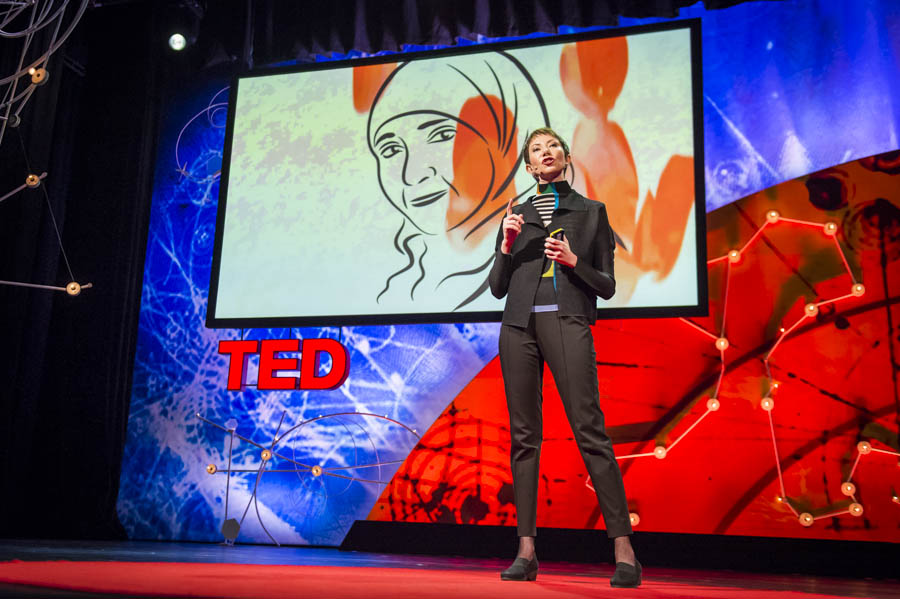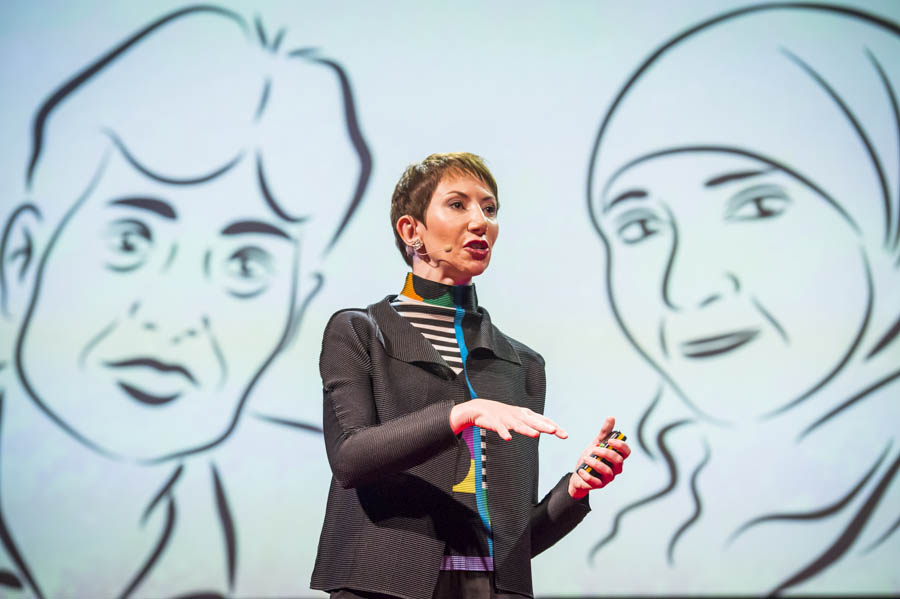TEDGlobal Fellow, and author of Sex and the Citadel, Shereen El Feki comes on stage to tell us about Faiza, a woman she met on a recent trip to Casablanca. Unmarried, and a new mother, Faiza proudly told El Feki her story as she showed off her young son. “It was a remarkable tale, but Faiza saved the best for last,” El Feki tells us. The young mother then boasted of still being a virgin, with not one but two medical certificates to prove it. “This is the modern middle east, where two millennia after the coming of Christ, virgin births are still a fact of life,” El Feki adds drily.
El Feki has spent years traveling throughout the Arab region to listen to people’s stories about sex. Stemming from her own work as an HIV/AIDS researcher and activist, the project has been a way for her to reconnect with her own background. Half Egyptian, she grew up in Canada, and she wanted to better understand her own origins. As she adds, “if you really want to know a people you start by looking inside their bedrooms.”
Of course, the “Arab world” is a huge place, and generalizations about those who live there are unwise. Nonetheless, attitudes and beliefs stretch broadly, particularly around three redline topics that remain taboo: politics, religion and sex. “Across the Arab region, the only accepted context for sex is marriage, approved by your family, sanctioned by religion, and registered by the state. Marriage is your ticket to adulthood. If you don’t tie the knot, you don’t move out of your parents’ place, you’re not meant to be having sex, and you definitely don’t have children,” she explains. And while the patriarchic system in the main turns a blind eye to young men having sex, women enjoy no such leeway. That’s why Faiza’s mother had helped her daughter flee the family when she could no longer hide the fact she was pregnant. “Honor killings are a real threat for untold numbers of women in the Arab region,” says El Feki. “At a hospital in Casablanca, the man who offered to help Faiza instead tried to rape her.”
Even within the confines of the so-called citadel, all is not necessarily well. Many young men cannot afford to marry in the first place, and a lack of communication and sex education leads to husbands and wives finding themselves unable to discuss their needs or desires. Sex is often a source of shame, and El Feki describes a gulf between appearance and reality. She quotes a doctor in Cairo, who remarked that sex is the opposite of sport. “With football, everyone talks about it but no one plays it. With sex, everyone is doing it but no one wants to talk about it.” It’s something of a hollow joke.
The Arab world wasn’t always so reticent. A thousand years ago, there were dictionaries of sex written in Arabic, often by religious writers. (El Feki reads us a choice selection.) But where Europe and the United States have opened up, Arab societies have been moving in the opposite direction, especially given the rise of religious fundamentalism. Nonetheless, things aren’t as black and white as the conservatives would have people believe, she says: “Islam offers us at least 50 shades of grey.”
Not all is lost, she concludes. There are many people working hard to help update, evolve and change the sexual status quo and try to remove sexual stigma from Arab society. “They face formidable opposition, but I am optimistic that in the long run times are changing, and they and their ideas will gain ground.” It’s not a question of confrontation, rather one of negotiation, to empower people to take control of their own bodies, feel free to express their own ideas, and make their own decisions around sex and sexuality. “It is the work of a generation at least,” says El Feki. As for anyone questioning whether now is the right time to talk about sex, given the political turmoil and unrest affecting so much of the region, El Feki has some firm advice. “At this critical moment in history, if we do not honor freedom and autonomy in our private lives, we will find them very hard to honor in our public lives. The political and the sexual are intimate bedfellows. That’s true for us all, no matter where we live and love.”


Comments (1)